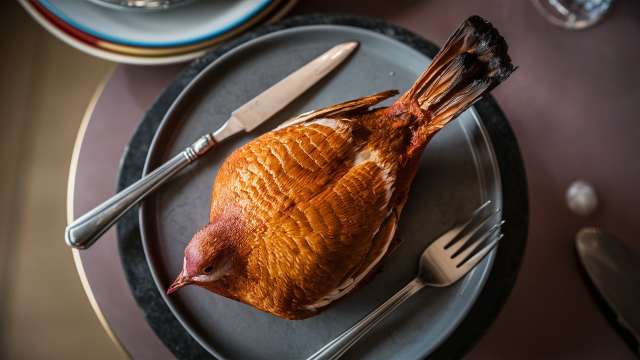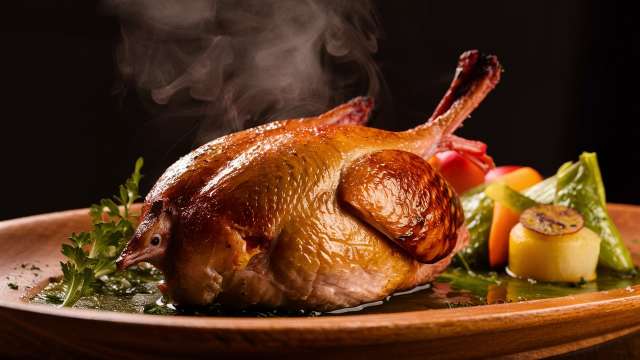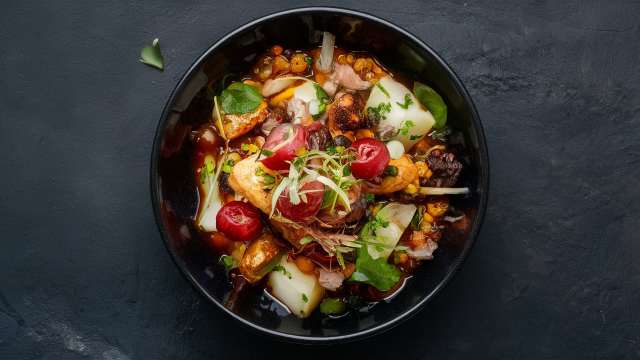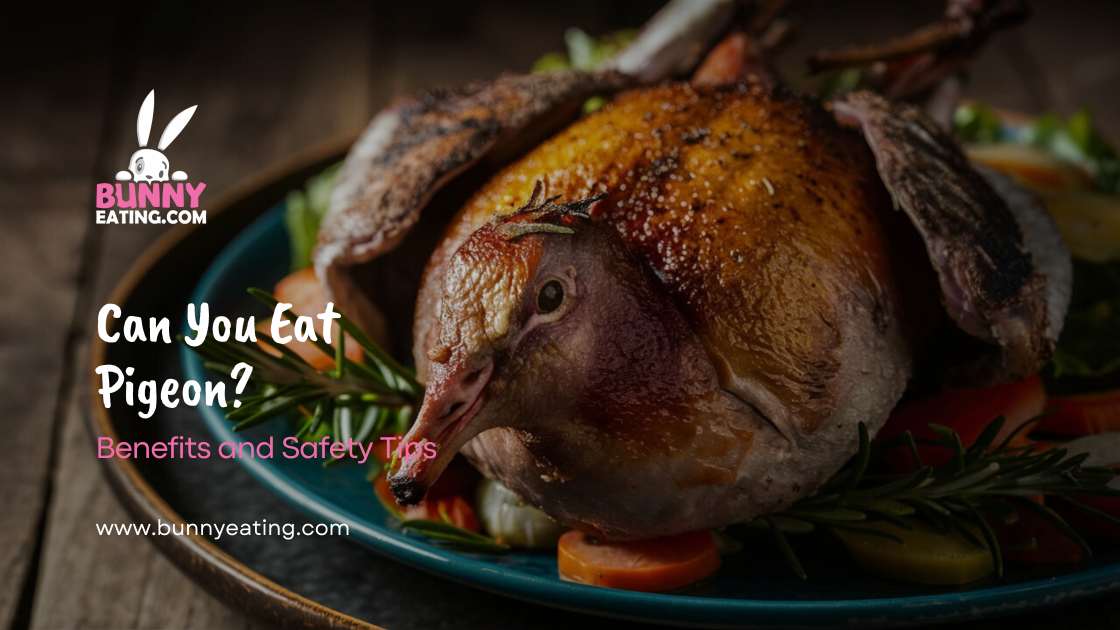The act of consuming pigeon meat as food is known as pigeon eating. Most of the time, it is derived from either domesticated or wild pigeons. For several years, various cultures have included it in their diets. Pigeon meat contains less fat than fowl such as chicken and duck. Can You Eat Pigeon?
Are you one who likes to try out new things? You should get pigeon meat and see whether I am telling the truth or not. In some countries, it is considered a delicacy; nevertheless, only a few people know about it. Therefore, let us explore this interesting topic more.
Pigeon flesh exudes fullness in flavour and is a dense source of nourishment. It is notably sought after across Europe, Asia, and the Middle East. Some people presume that it is healthier than other more conventional meats like beef or pork. Is it, nevertheless, safe and lawful to consume? Let us unravel.
Historical Context: The Tradition of Eating Pigeon
Pigeon consumption has a rich history dating back to ancient civilizations. In Egypt, Rome, and Greece, pigeons were highly prized for their meat and were often associated with nobility and prosperity. This cultural significance extended to early American cuisine as well, with squab featuring in many traditional recipes from the colonial era through the early 20th century.
Various cultural groups utilize pigeons in various ways for food. As French people, the pigeon is regarded as a palatable dish which features prominently in various recipes such as Pigeon en Croûte. On the other hand, Middle Eastern rice preparations often include pigeons while the Chinese have been known to historically prepare stuffed pigeons. This difference in methods of cooking indicates the degree of versatility and global popularity accorded to pigeon meat.
Nutritional Value of Pigeon Meat
Many people would not expect pigeon meat to have such a distinct nutritional composition. This makes it an ideal choice for individuals seeking to consume protein-containing minimal fats. Moreover, pigeon meat contains high levels of vitamins and minerals, especially iron, zinc, and B vitamins. The fat content found in pigeon meat is less than that found in many other types of meat from fowl.
When comparing pigeons to other poultry, they often stand out for their nutritional density. Here’s a comparison table of the nutritional content per 100g of cooked meat:
| Nutrient | Pigeon | Chicken | Duck |
| Protein | 22g | 31g | 19g |
| Fat | 7g | 3.6g | 13g |
| Iron | 3.8mg | 1.3mg | 2.7mg |
| Zinc | 2.7mg | 2mg | 2.5mg |
As we can see, pigeon meat holds its own in terms of protein content and excels in providing essential minerals like iron and zinc.
Is It Safe to Eat Pigeon? Health Considerations
When considering the safety of eating pigeons, it’s important to distinguish between wild urban pigeons and farm-raised squab. Wild pigeons, especially those in urban environments, can carry diseases and may have been exposed to pollutants, making them potentially risky for consumption. The main health risks associated with wild pigeons include exposure to parasites and bacteria like Salmonella.
To ensure safe consumption, there are several precautions to take. First and foremost, it’s recommended to only consume farm-raised pigeons or those hunted from clean, rural environments. When preparing pigeon meat, proper handling and cooking are crucial. Always cook pigeon meat thoroughly to an internal temperature of 165°F (74°C) to eliminate any potential pathogens. By following these guidelines, the risks associated with eating pigeons can be significantly minimized.

Wild vs. Farm-Raised Pigeons: What’s the Difference?
The distinction between wild and farm-raised pigeons is significant when it comes to culinary use. Farm-raised pigeons, typically sold as squab, are bred specifically for consumption. They are fed a controlled diet and raised in clean environments, resulting in a consistent quality of meat. Wild pigeons, on the other hand, have a more varied diet and lifestyle, which can affect their flavour and texture.
Most of the time, domesticated pigeons have a very gentle taste as compared to their wild relatives. Unlike those of wild doves, the flesh from farmed and raised birds is usually tender. Nevertheless, farming practices for pigeons are considered safer in terms of nutrition than wild birds since they avoid being contaminated or infected by diseases that are common among starved pigeons.
Pigeon as a Delicacy: Popular Dishes and Recipes
Pigeon has been featured in many renowned dishes across various cuisines. In French cuisine, “Pigeon aux Petits Pois” (Pigeon with Peas) is a classic preparation that highlights the delicate flavour of the bird. In Chinese cuisine, the crispy-skinned pigeon is a popular delicacy, often served at high-end restaurants. These popular dishes showcase the versatility of pigeon meat in different culinary traditions.
If you want to include pigeons in your meals, there are many easy recipes that you can try. Beginners might prefer a basic baked pigeon with spices. For this recipe, add salt and pepper along with herbs such as thyme or rosemary, then roast the bird for 20-25 minutes at 400°F (200°C). You could do other things like grilling it, braising or using it in pâtés to enhance adventure in cooking.
Ethical Considerations: Should You Eat Pigeons?
The ethical considerations surrounding pigeon consumption are complex and multifaceted. On one hand, farm-raised pigeons can be part of sustainable farming practices when raised with proper animal welfare standards. These birds typically have a shorter lifespan compared to other poultry, which some argue reduces their overall suffering. However, as with any animal farming, concerns about the ethics of raising animals for food remain.
In discussing how to eat pigeons, one often gets drawn into debates that deal with culinary traditions versus animal rights issues. Some people believe that pigeon farming can be done ethically and sustainably with little impact on the environment, so it serves as a source of protein that is environmentally friendly.
Others, however, argue that there is no need to raise pigeons for food since other types of protein are easily accessible. Many times it comes down to personal convictions as far as including pigeons in one’s diet or not is concerned.

Legal Aspects: Where Is It Legal to Eat Pigeon?
In the United States, the consumption of farm-raised pigeons (squab) is legal and regulated by the USDA. These birds are subject to the same inspection and safety standards as other poultry. However, the legality becomes more complex when it comes to wild pigeons. In many urban areas, it’s illegal to hunt or trap pigeons due to local ordinances and wildlife protection laws.
Hunting rules for wild pigeons differ based on the region. In some remote areas, hunting pigeons is authorized at certain times of the year upon showing appropriate licenses. Before hunting or eating wild pigeons, it is paramount to consult local statutes and regulations. Regarding buying pigeon meat, squab from farms can be found in several specialized meat shops and ordered from poultry farms in compliance with federal and state meat sale laws.
How to Prepare and Cook Pigeons Safely
Here is how to prepare a pigeon to cook it safely. The first step should be ensuring it is clean by taking the feathers off and removing everything (guts included). If you have a full pigeon, cutting it up into pieces will make sure that it cooks evenly. Always make sure that there are no chances of cross-contamination when handling raw pigeon meat therefore use separate cutting boards and utensils.
For cooking pigeons, roasting is a popular method that brings out the bird’s natural flavours. Preheat your oven to 400°F (200°C), season the pigeon with salt, pepper, and herbs, and roast for about 20-25 minutes for medium-rare. For crispy skin, finish under the broiler for a few minutes. Alternatively, you can grill pigeon for about 5-7 minutes per side, or braise it in wine and stock for a more tender result. Always ensure the internal temperature reaches at least 165°F (74°C) for safe consumption.
Alternatives to Pigeon Meat: Exploring Other Game Birds
If you’re not sold on pigeons but crave the taste of wild game birds, a range of substitutes exist. Common game birds include quail, pheasant, and dove which have similar tastes as these exotic species. They tend to be rather accessible in American gastronomy and perhaps more familiar to the US eater’s palate.
The taste and texture of these alternatives to pigeons are markedly different. For instance, quail has a milder taste and finer meat than that of pigeons. Pheasant is often likened to chicken, only richer and more flavorful. This table shows what nutrition contains 100g of cooked meat:
| Bird | Protein | Fat | Calories |
| Pigeon | 22g | 7g | 150 |
| Quail | 25g | 14g | 227 |
| Pheasant | 27g | 3g | 133 |
This comparison shows that while these game birds offer similar protein content, their fat content and overall calorie count can vary significantly.

Conclusion
Yes, you can eat pigeons, and it has been a part of many diets for a long time. Pigeon meat is rich in flavour and nutrients, making it a tasty and healthy option. In many cultures, people enjoy it as a special dish, and it is often served in fine restaurants. If you choose to try it, you can find recipes that highlight its unique taste.
Ultimately, consuming pigeons is a preference that some people appreciate. Although it is not as popular as other types of meat, it provides a unique experience. If you have an insatiable desire for knowledge or are adventurous when it comes to food, then pigeons could be your thing. Freshness and good cooking of the meat are crucial.
FAQs
What is pigeon meat called?
Pigeon meat is often called squab when referring to young pigeons. Older pigeon meat may still be called pigeons.
Can pigeons be cooked?
Yes, pigeons can be cooked in various ways like roasting, grilling, or braising.
Is pigeon white or red meat?
Pigeon meat is considered red meat, similar to duck.
Is pigeons safe to eat in Egypt?
Yes, pigeons are safe to eat in Egypt, and it’s a traditional dish called hamam mahshi (stuffed pigeon).











